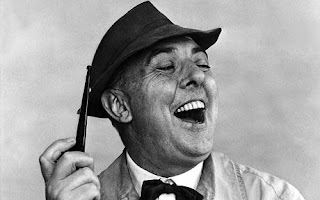8.13.2012
Jacques Tati was an Artist
I just recently re-watched Playtime which is one of my favorite Tati films (not that there are many to choose from, but I think Mon Oncle will remain my favorite for a long time). When I re-watch any of his films, I watch for three things: Subtleties, Slapstick and Sound. When it comes to a Tati film, if you're not looking for those three things as well, I hate to say it but... you're doing it wrong! You cannot enjoy his films by just watching them as if they are like any other film out there. Tati was an artist and you need to concentrate on the details he created in his art.
I'm not exactly a film buff. I haven't seen every film out there, I never studied cinema, but I can surely have a right to my opinions on film, especially when I can classify a film as a work of art, right? So my question when re-watching Playtime is, does it still hold up after all these years? I was born in 1989, so I have no idea of what life was like in 1967. I don't know what life was like before 1991, so how can I judge the quality of a film from a time in which I did not live? You could say the same thing about a Renaissance painting (I did study art history), but I truly have no point of reference for film.
I understood the qualities of Tati's sense of humor at age 15. I thoroughly enjoy every one of his films to this day, but when thinking about showing them to people my age or younger, I'm not so sure they would be too pleased with what they were getting themselves into.
Playtime is just over two hours long, has practically no dialogue, and has a very thin if non-existent plot. When there is dialogue it's either in mumbled French (translated through subtitles) or very clear English (that must have been dubbed over and to me is almost always unnecessary for the film). The real communication in the film is done through body language. It's subtle, but it's worth paying attention to how people are interacting with one another across the screen.
The film begins with a French couple sitting together in an airport. The wife is asking her husband if he has everything, like his cigarettes, and tells him he needs to button the top button of his coat or he'll catch a cold. There are some subtitle translations of their conversation, but if you could turn those off and just watch their body language with one another, you'd be able to figure out their entire relationship and conversation. It's choreographed down to the second.
You don't need an amazing sound system for this film, but you should have your sound turned up for the entirety of this film. In the scene (posted above) where Hulot (Tati) is waiting for a meeting you can hear everything from the florescent lights humming to the sound the chair makes when someone stands up from it. The first scene (in the airport) prepares you for this, because there are many sounds, but they are presented slowly and separately. When I was younger and I watched Playtime for the first time, I was told to pay attention to the sound in the film, and I remember very clearly the week after I watched the film, I could hear every sound imaginable around me. Tati presents sound in such an idealistic sense that you can't help but continue to "listen" even after the film is over.
I don't want to ruin the slapstick element for you at all, but I will tell you that the majority of it lies in the nightclub scenes closer to the end of the film. So in case you watch the first hour and are utterly bored (because it's not exactly a fast and exciting plot line) you'll know you have something to look forward to in the second hour.
My one complaint about the film is the presence of the many Hulot doppelgangers in the film. Playtime was the first Tati film that I saw, so I had no idea who M. Hulot was, and I couldn't guarantee that people who see the film today would have already seen M. Hulot's Holiday or Mon Oncle. The element may have been hilarious when the film was created, especially for fans of M. Hulot, but now it seems somewhat passé and uninteresting for new viewers.
When The Illusionist came out a couple of years ago I went to see it, and I left with my heart thoroughly warmed. The film is not only a love letter from a father to his daughter, but because Tati only wrote the script but had nothing to do with the production, it was a love letter to Tati and his career (although some critics would argue that the film is not at all good, so don't take my word for it). If you want to watch that first, I would say go for it, and then watch Mon Oncle, and then round out your watching party with Playtime. Then at another date watch M. Hulot's Holiday, because you can only laugh so much in one evening before your insides begin to hurt.
To answer my own question, I think the general message of Playtime, and also Mon Oncle and Trafic, deals with consumerism and how we are obsessed with the future of the materialistic world. These ideas are extremely present in today's society, just on a different level. So yes, the films do stand up to a degree... so why are you sitting here reading my ramblings, go update your Netflix queues!
Labels:
1967,
Art,
Body Language,
Film,
Humor,
Jacques Tati,
Mon Oncle,
Playtime,
Slapstick,
Sound,
The Illusionist
Subscribe to:
Comments (Atom)









